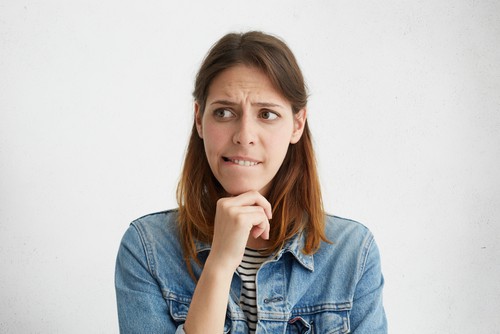Why Do I Bite My Lips, Cheeks, and Tongue?
Posted January 24, 2020 by Dr. Brian Evans

Biting your lips, cheeks, or tongue is a common habit for many people. While it may seem relatively harmless, biting the soft tissues in our mouths can lead to serious and painful problems. But like any habit, it can be difficult to stop biting your lips, cheeks, or tongue. Join your Reno dentist as we share a bit about why biting is bad and what you can do to break the habit.
Why We Bite
There are several possible explanations behind why we bite our lips, cheeks, or tongue. Occasionally, stress or nerves can be to blame. If you’re someone who chronically bites, this is most likely the case. But there are things you can try to help you stop. First, try to become more aware of when you bite. Maybe it’s during times of high stress or perhaps when you’re concentrating really hard. Once you know when you’re more likely to bite, you can start to work on consciously recognizing it and stopping it.
Other times, biting a lip, cheek, or tongue is purely accidental and can happen while we’re chewing or even during a sneeze. Even though these accidental bites can be painful and may even bleed, they’re usually not something to be concerned about and should heal on their own. However, there are some people who seem to bite their lip, cheek, or tongue accidentally a lot. If this is the case, it could be a sign of something a bit more serious such as a bad bite or TMJ disorder. Both of these dental concerns can mean that your top teeth don’t line up properly with your bottom teeth which makes it really easy for an accidental chomp to your cheek, lip, or tongue to occur. Your dentist in Reno will be able to help you determine if this is the case for you.
Why is Biting Bad?
First and foremost, biting the soft tissues of the mouth hurts, and the pain can last for a few days after the initial bite due to the sore that pops up as a result of the trauma. These sores that develop after a bite can become infected if they aren’t cleaned. Additionally, chronic biters can suffer from inflammation, swelling, pain, and redness. But that’s not all. If a bad bite or TMJ disorder is playing a role in your biting, you may also experience the common symptoms that accompany those problems including headaches and jaw pain.
How Do You Stop Biting?
Treatment of lip, cheek, or tongue biting depends on what’s causing it in the first place. If biting is a nervous habit, try to work with yourself to consciously stop it. More severe cases can benefit from behavioral therapy. If you suspect that your chronic accidental biting is because of a bad bite, schedule an appointment with your dentist in Reno. Your dental team is trained to help identify a bad bite and can suggest the most appropriate treatment for your specific case so you can stop biting once and for all.



